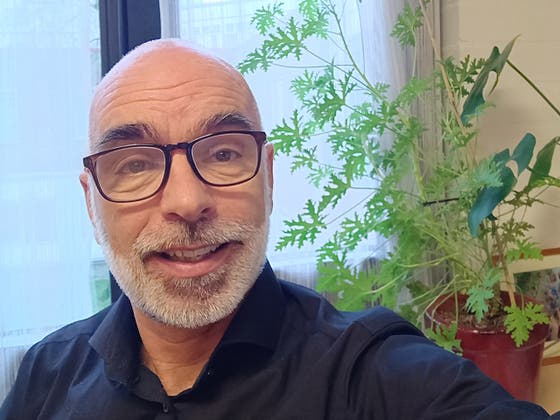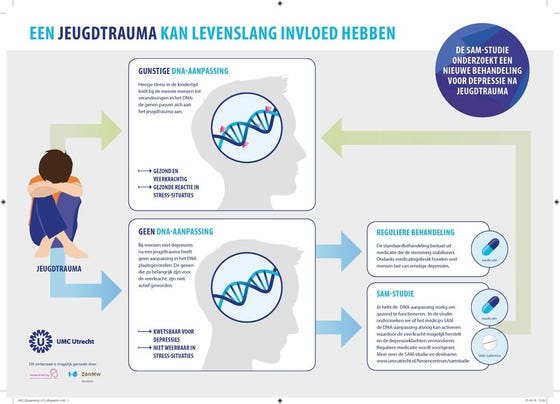Modifying DNA to reduce depression caused by childhood trauma
The DNA of people who have experienced childhood trauma often adapts itself. This makes them more resilient. If this adaptation does not take place, people are more likely to suffer from depression. Researchers at UMC Utrecht are trying to do something about this with the help of the dietary supplement SAMe.

Traumatic events in childhood often cause molecular changes in the DNA. These events can be physical or emotional abuse, neglect or other violent events in childhood.
"We first thought that these genetic modifications were harmful, that they were scars, but they turn out to actually contribute to the resilience mechanism," says Marco Boks, psychiatrist and researcher at UMC Utrecht. He is involved in the research project 'Recovering mood stability by repairing the epigenetic traces of childhood trauma', also known as the SAM study and funded by the Dutch Brain Foundation and ZonMw.
What if the DNA does not adapt?
However, not everyone with childhood trauma has these healthy adaptations in their DNA. "In this case, the risk of depression, post-traumatic stress disorder (PTSD) and physical complaints later on is higher," says Boks.
The aim of the research project is to create this favorable adaptation in the DNA in the hope that this will reduce symptoms of depression. The participants - people with a childhood trauma and depression symptoms - will receive daily medication or a placebo for twelve weeks. In addition, all of them receive trauma therapy, mostly EMDR.
Increasing resilience
At the beginning and end of the study, participants' blood is collected to see if there is a change in DNA following the trial. "The DNA code itself doesn't change, only the parts that are active," Boks explains. "Trauma triggers processes that can make people sick. If you can 'put those in a state of rest' you increase resilience. We try to influence this process through medication and therapy."
It is difficult to say in how many people with trauma this DNA adjustment is made, Boks explains. It depends, for example, on what happened as well as when and by whom the trauma was caused.
Dietary supplement as therapy
The medication consists of the drug S-Adenosyl-methionine (SAMe) in tablet form. "This is a dietary supplement that your body already naturally contains," Boks explains. "If you have high amounts of this substance in your body, the beneficial DNA modification can be made more easily than if you don't."
The added value of translational research - channeling results from basic research into practice - is evident in this research. "Thanks to this program, we've been able to take a huge step forward," says Boks. He and his colleagues began by studying the influence of SAMe on cells. "The effects of stress hormones were found to be reversed. Since the drug is safe for humans, no animal studies were needed and we could do studies with people directly."

The SAM study investigates new treatments for depression after childhood trauma
Innovating together with patients
Boks also believes it is important that the patient is at the center of this research. A panel of experience experts, a patient focus group and patient organizations are working closely with the researchers. "They have advised us, both in the design and in the practical implementation, so that it has become a patient-friendly study."
The study began in 2019 and is scheduled to be completed in 2023. Thirty people are participating so far and the aim is to include a total of 100 participants.
For more information or participation, see: SAM Study.
Watch the UMC Utrecht webinar where Marco Boks and colleagues explain how trauma affects human resilience.
This project is part of the Translational Research Program. Read more about this project 'Recovering mood stability by repairing the epigenetic traces of childhood trauma'.
Return to the Translational Research home page.
Text Thessa Lageman
© ZonMw 2021
